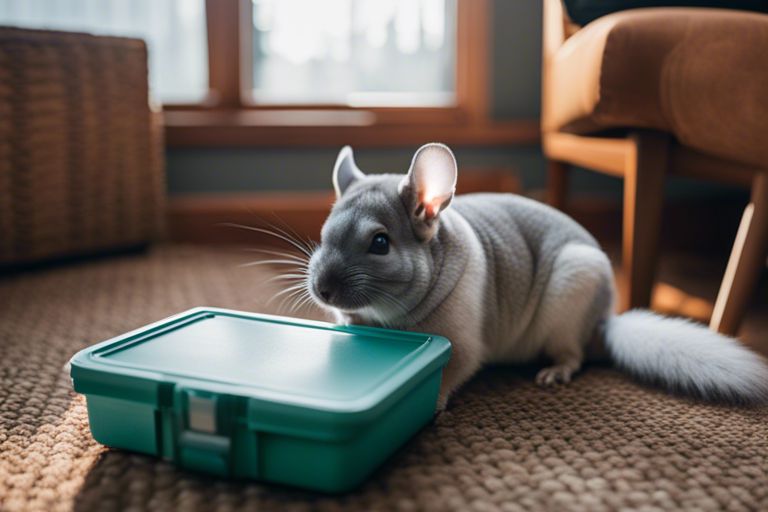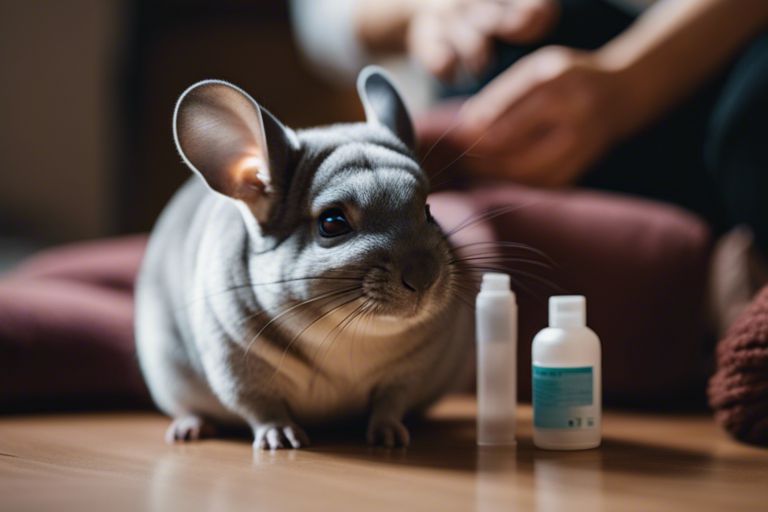If your chinchilla is showing signs of illness or injury, it’s essential to act quickly by creating a calm environment and seeking veterinary care from an exotics specialist. Chinchillas are sensitive animals whose health can deteriorate quickly without prompt treatment. This guide covers the steps to take if your chinchilla is unwell, common symptoms, and ways to prevent future health issues.
Key Takeaways
- Monitor Symptoms: Observe behavior and physical symptoms closely, as chinchillas may hide signs of illness.
- Seek Veterinary Care: Find a vet experienced in exotic animals to provide the best care for your chinchilla.
- Calm Environment: Keep your chinchilla in a quiet, stress-free space with access to water and a suitable diet.
Recognizing Signs of Illness or Injury
| Symptom | Possible Cause | Action |
|---|---|---|
| Lethargy | Stress, illness, or injury | Seek veterinary care |
| Loss of Appetite | Digestive issue, dental problems | Contact an exotics vet immediately |
| Limping or Difficulty Moving | Injury from fall or interaction | Provide calm environment; seek vet |
| Labored Breathing | Respiratory infection, poor ventilation | Urgent vet care needed |
| Discharge (eyes/nose) | Respiratory infection or other illness | Consult vet for diagnosis |
These symptoms are indicators of potential health issues. If you observe any combination of these signs, seek veterinary assistance promptly.

Immediate Actions for a Sick or Injured Chinchilla
1. Provide Immediate Care
If you notice your chinchilla is unwell or injured, create a safe, quiet environment immediately. Reduce noise and disturbances to help your pet feel secure and prevent further stress.
2. Contact a Vet Specializing in Exotic Animals
Chinchillas require specialized care that general vets may not provide. Find an exotics vet familiar with chinchilla health and seek an appointment if symptoms persist or worsen.
3. Keep Your Chinchilla Warm and Hydrated
Provide a warm, comfortable space for your chinchilla. Ensure access to fresh water and avoid handling unless necessary, as injured chinchillas are often stressed.
Preventative Health Measures for Chinchillas
Proactive care is essential to reduce the likelihood of illness and injury. Below are key steps to help keep your chinchilla healthy and safe.
Create a Safe Environment
Ensure your chinchilla’s habitat is secure, escape-proof, and free of hazards like wires or small spaces where they can get stuck. Proper ventilation helps prevent respiratory issues, so ensure their enclosure is well-aired.
Balanced Diet and Exercise
Provide a diet rich in high-quality hay, pellets, and occasional chinchilla-safe treats to meet their nutritional needs. Encourage exercise by offering time outside the cage under supervision, which keeps them physically and mentally active.
Regular Health Checks
Scheduling annual check-ups with an exotics vet can help catch potential health issues early. Regular monitoring allows for early detection of common problems like dental issues or digestive stasis.
Dealing with Specific Health Issues
Understanding common ailments in chinchillas can help you recognize issues early and seek appropriate treatment.
Common Health Issues and Symptoms
- Gastrointestinal Stasis: Symptoms include bloating, lethargy, and reduced appetite. Stasis can be life-threatening, so seek vet care immediately.
- Dental Issues: Overgrown teeth may lead to drooling, loss of appetite, and difficulty eating. Regular vet checks can help prevent these issues.
- Respiratory Infections: Signs include labored breathing, nasal discharge, and sneezing. Ensure proper ventilation and seek prompt treatment if symptoms arise.
Injury Prevention and First Aid
Chinchillas are agile but delicate creatures who can injure themselves in various ways. Creating a safe living environment reduces the risk of accidents.
Safe Habitat Setup
- Avoid Sharp Edges and Narrow Spaces: Chinchillas may injure themselves in tight spaces or on sharp cage accessories.
- Provide Soft Landing Areas: Add soft bedding to cushion falls if they jump from heights.
Responding to Minor Injuries
For minor cuts or scratches, clean the area gently with a pet-safe antiseptic. If the injury appears serious, like a broken bone or deep wound, seek veterinary care immediately.
Conclusion
Taking swift action is crucial if your chinchilla shows signs of illness or injury. Monitor their symptoms, provide a calm environment, and seek immediate veterinary care. Regular health checks, a safe living space, and a balanced diet are essential for preventing illness and ensuring your chinchilla’s well-being. By staying vigilant and proactive, you can help your chinchilla recover and thrive.
FAQ
Q: How can I tell if my chinchilla is sick or injured?
A: Look for signs like lethargy, appetite loss, limping, or unusual behavior. Immediate vet care is essential if you notice these symptoms.
Q: What should I do if my chinchilla is unwell?
A: Keep your chinchilla in a quiet, comfortable space, and contact an exotic pet vet as soon as possible for diagnosis and treatment.
Q: How can I prevent my chinchilla from getting sick?
A: Maintain regular vet check-ups, a balanced diet, and a clean environment. Monitoring their behavior and health closely helps catch early signs of illness.
Q: How should I handle a sick or injured chinchilla?
A: Handle gently and only if necessary, as injured chinchillas may be stressed. Place them in a calm area, away from loud noises and disturbances.
Q: What are common ailments in chinchillas I should watch for?
A: Gastrointestinal stasis, respiratory infections, and dental problems are common. Watch for symptoms like bloating, labored breathing, or drooling and consult a vet if they arise.
